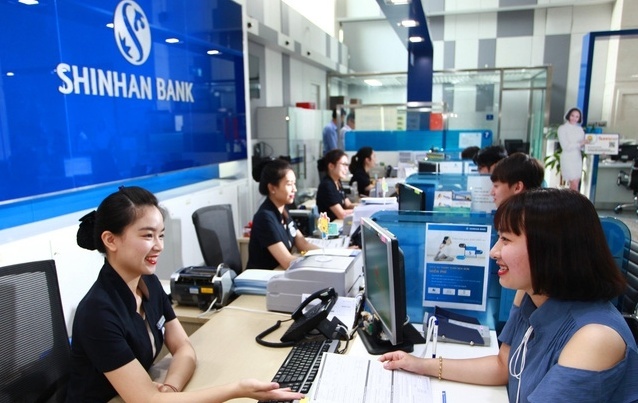[Economy in Pandemic] S. Korean banks face fierce ASEAN market competition in post-virus era
Despite pandemic impact, ASEAN countries remains lucrative for local lenders
By Jung Min-kyungPublished : June 9, 2020 - 15:46

Despite the pandemic impact being felt across the world, South Korean
banks are retaining their faith in the ASEAN countries -- dubbed as a new market with relatively high interest rates and demand for fresh funds.
With travel restrictions to key ASEAN markets likely to be lifted soon -- as there are zero coronavirus deaths in Vietnam and Cambodia so far -- the countries will not only work as a breather for the lenders, but also as a battleground for heightened competition.
The combined net profit of overseas businesses of four major commercial banks here -- KB Kookmin, Shinhan, Woori and Hana -- declined 13.8 percent on-year to 246.9 billion won ($204.9 million) from January to March, when cases related to the coronavirus were getting registered across the globe in a fast pace.
Amid the frenzy, three lenders here -- KB Kookmin, Industrial Bank of Korea and Korea Development Bank -- has recently clinched preliminary licenses to launch subsidiaries in Myanmar, the lenders said in April. Myanmar is notorious for being strict with granting licenses to foreign banks, although its market is referred to as “post-Vietnam” by economic experts, due to its growth potential.
Local lenders have been operating branches and offices in Myanmar for nearly a decade, but have yet to establish subsidiaries there.
“The coronavirus pandemic has delayed the Myanmar government’s selection process for around two months, but overall our plans concerning our key projects in the ASEAN market are progressing smoothly,” a KB Kookmin spokesperson told The Korea Herald on Tuesday, adding that the lender plans to launch the subsidiary by the second half of the year.
Once the launches are finalized, the lenders are expected to rub shoulders in the housing loan market there, seeking to create synergy with the Myanmar government’s project to create a collective residential complex for low-income families.

On the back of South Korean President Moon Jae-in’s New Southern Policy -- aimed at deepening ties with Southeast Asian nations, banks have been increasing their presence in the ASEAN countries. The market has grown as their key source of revenue.
According to the Financial Supervisory Service, South Korean banks had a combined 195 subsidiaries, branches and representative offices in 39 countries overseas as of end-2019.
A total of eight of such operations were newly launched last year and five of them were fresh additions to the lenders’ ASEAN sales network, including IBK’s Indonesian subsidiary and KB Kookmin’s Vietnam branch.
The combined net profit for their Vietnam operations came to $156 million in the cited period, which was higher than the corresponding figures of $149 million for Hong Kong and $110 million for China, respectively. Vietnam alone accounted for nearly 10 percent of the combined overseas net profit for 2019, which totaled $988 million.
In terms of individual banks, Jeonbuk Bank’s Cambodian subsidiary Phnom Penh Commercial Bank, logged a net profit of 20.7 billion won ($17.4 million) alone in 2019, up 40.5 percent on-year.
The robust revenue alongside Korea’s low interest rates and an expected shift in the global production chain from China to ASEAN nations such as Vietnam in the post-virus era are expected to further drive local lenders to the ASEAN market.
The latest pandemic has pushed the Bank of Korea to slash its base rate to a record-low of 0.5 percent, dragging down the lenders’ interest rates on loans and other products as well. Commission fees from products and loans have remained the main source of revenue for local banks for decades and experts have been calling for the need to diversity their options.
“The center of the global production chain is forecast to move to Vietnam from China in the post-virus era, as it has been a favored destination for such changes in trade flows and has been containing the coronavirus effectively,” Oh Chul, a global business professor at Sangmyung University said.
By Jung Min-kyung (mkjung@heraldcorp.com)








![[Kim Seong-kon] Democracy and the future of South Korea](http://res.heraldm.com/phpwas/restmb_idxmake.php?idx=644&simg=/content/image/2024/04/16/20240416050802_0.jpg&u=)








![[KH Explains] Hyundai's full hybrid edge to pay off amid slow transition to pure EVs](http://res.heraldm.com/phpwas/restmb_idxmake.php?idx=652&simg=/content/image/2024/04/18/20240418050645_0.jpg&u=20240418181020)

![[Today’s K-pop] Zico drops snippet of collaboration with Jennie](http://res.heraldm.com/phpwas/restmb_idxmake.php?idx=642&simg=/content/image/2024/04/18/20240418050702_0.jpg&u=)